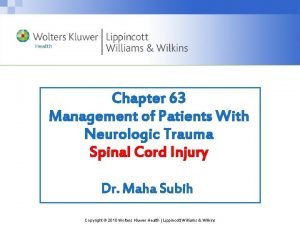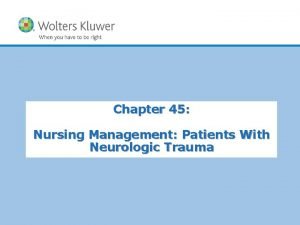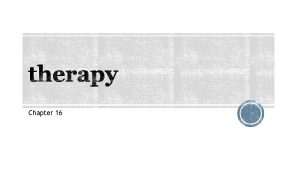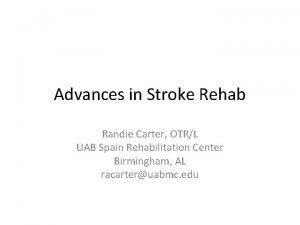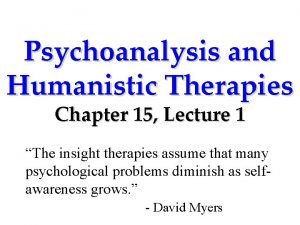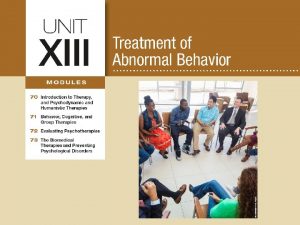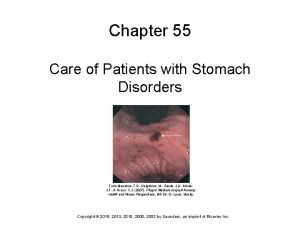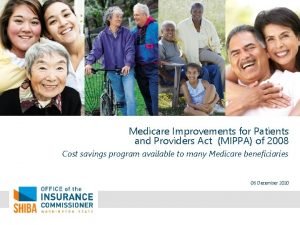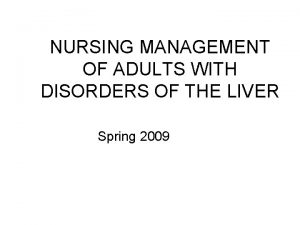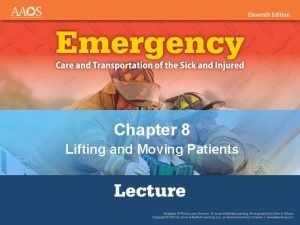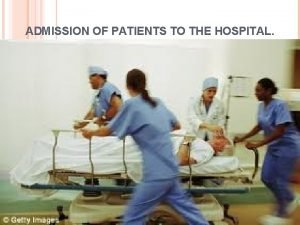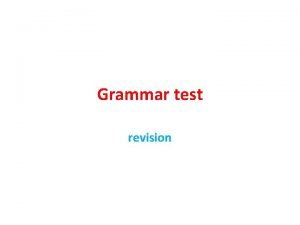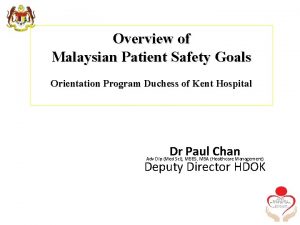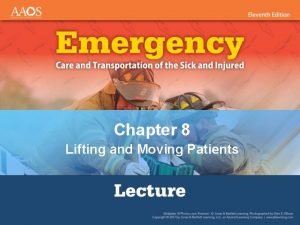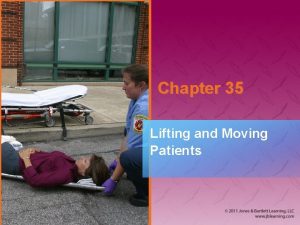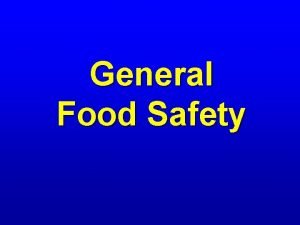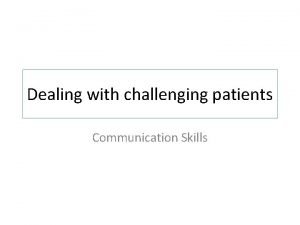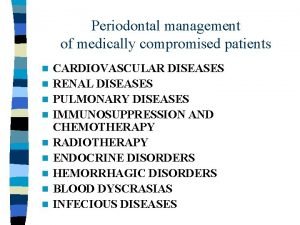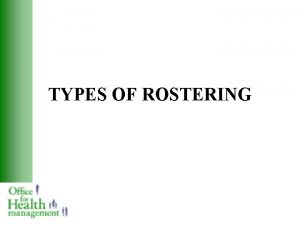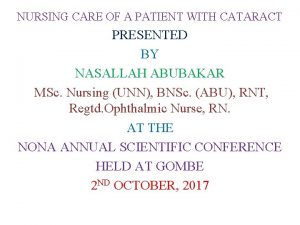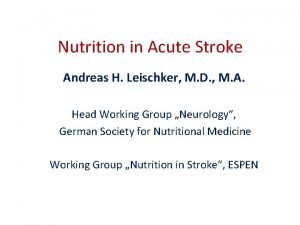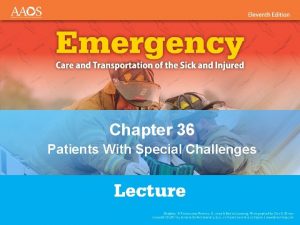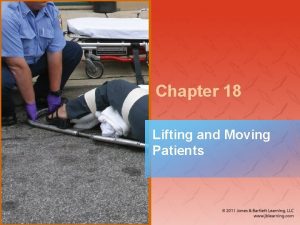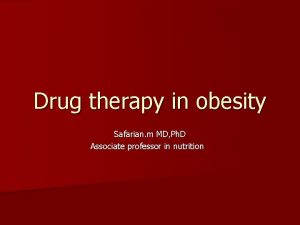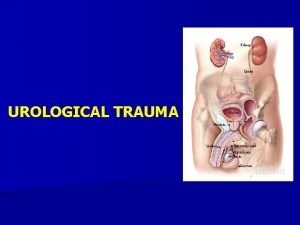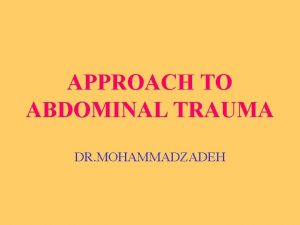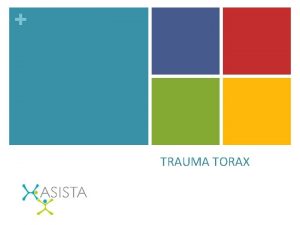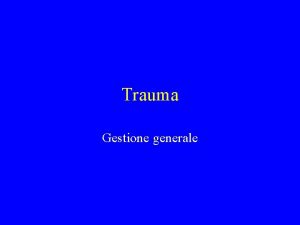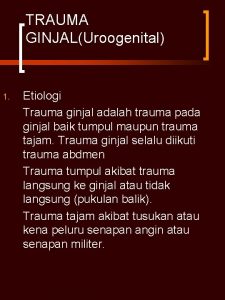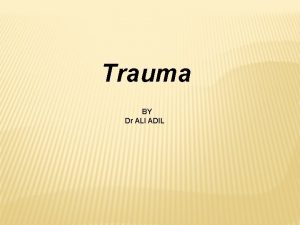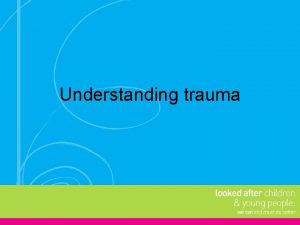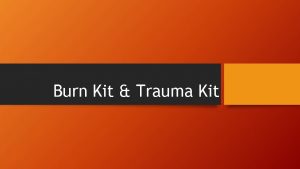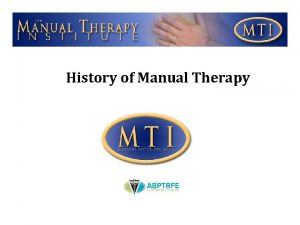Nutritiona therapy in trauma patients M Safarian MD
































- Slides: 32


Nutritiona therapy in trauma patients M. Safarian, MD Ph. D.

Pathophysiology of Trauma · Definition: any sudden physical damage to the body · Mostly occurs in young patients – Little or no protein-depletion



Energy Expenditure Metabolic Response to Trauma Ebb Phase Flow Phase Time Cutherbertson DP, et al. Adv Clin Chem 1969; 12: 1 -55

Metabolic Response to Trauma: • Ebb Phase n. Characterized by hypovolemic shock n. Priority is to maintain life/homeostasis Cardiac output Oxygen consumption Blood pressure Tissue perfusion Body temperature Metabolic rate

Metabolic Response to Trauma: § Flow Phase § Catecholamines § Glucocorticoids § Glucagon § Release of cytokines, lipid mediators § Acute phase protein production

Metabolic Response to Trauma Endocrine Response Fatty Deposits Fatty Acids Liver & Muscle (glycogen) Glucose Muscle (amino acids) Amino Acids

Metabolic Response to Trauma 28 Nitrogen Excretion (g/day) 24 20 16 12 8 4 0 10 20 Day Long CL, et al. JPEN 1979; 3: 452 -456 s 30 40

Severity of Trauma: Effects on Nitrogen Losses and Metabolic Rate Nitrogen Loss in Urine Major Cirugía mayor Surgery Quemadura Moderate to Severe moderada a grave Burn Severe Sepsis grave Infection Infecci ón Sepsis Cirugía Elective electiva Surgery Basal Metabolic Rate Adapted from Long CL, et al. JPEN 1979; 3: 452 -456

Cardio vascular Response to Trauma · First : increase heart rate and total peripheral vascular resistance. · Blood loss of one third: fall in blood pressure and bradycardia syncope. · Blood loss of > 44% : tachycardia · Compromised blood supply in the gut: bacterial translocation

Inpatient management § Electrolyte and volume correction § Hydrodynamic control § Determine the type of nutrition support § Determine nutritional demand

Timing and Route of Feeding · Timing of feeding: within 24 -48 hrs · Route of feeding: EN is preferred to PN · Stomach is preferred to small bowel · Small bowel is preferred if : – flail chest, spinal cord injury, severe pelvic fracture, major soft tissue injury or closed head injury.

Timing and Route of Feeding · Total enteral nutrition (TEN) – Prevent gut mucosa atrophy – Preserve gut flora – Better ultilization of nutrients – Reduce stress response – Maintain immunocompetence

Timing and Route of Feeding · Contraindication – Full-blown shock – Sepsis and incomplete resuscitation: reduced splanchnic blood flow → nonocclusive bowel necrosis

Determining Calorie Requirements § Indirect calorimetry § Harris-Benedict x stress factor x activity factor § 25 -30 kcal/kg body weight/day

Determining Calorie Requirements § Using harris benedict to calculate REE: § Males = 66. 5 + (13. 5 W) + (5 H) - (6. 8 A) § Females =655 + (9. 6 W) + (1. 8 H) - (4. 7 A) § Error : 7 -24 % more than real needs.

Determining Calorie Requirements Injury Minor surgery Long bone fracture Cancer Peritonitis/sepsis Severe infection/multiple trauma Multi-organ failure syndrome Burns Activity Confined to bed Out of bed Stress Factor 1. 00 – 1. 10 1. 15 – 1. 30 1. 10 – 1. 30 1. 20 – 1. 40 1. 20 – 2. 00 Activity Factor 1. 2 1. 3

Metabolic Response to Overfeeding n. Hyperglycemia n. Hypertriglyceridemia n. Hypercapnia n. Fatty liver n. Hypophosphatemia, hypomagnesemia, hypokalemia Barton RG. Nutr Clin Pract 1994; 9: 127 -139

Metabolic Response to Overfeeding n. Over feeding : increase in TEN (thermic effect of nutrition) up to 30% & affect cardio vascular & pulmonary system. n. TEN is depends on : substrate and the rate n The largest is for protein : 20 -30% n Moderate increase by CHO: 6 -8% n Minimum by fats: LCT< MCT 2 -3%

Macronutrient needs during Stress Carbohydrate n. At least 100 g/day needed to prevent ketosis n. Carbohydrate intake during stress should be between 30%-40% of total calories n. Glucose intake should not exceed mg/kg/min 5

Macronutrient needs during Stress Fat n. Provide 20%-35% of total calories n. Maximum recommendation for intravenous lipid infusion: 1. 0 -1. 5 g/kg/day n. Monitor triglyceride level to ensure adequate lipid clearance

Macronutrient needs during Stress Protein: n. Requirements range from 1. 2 -2. 0 g/kg/day during stress (all pnt losses should be fully replaced) n. Comprise 20%-30% of total calories during stress.

With resolving stress, the energy requirements remain the same but the protein needs decrease to 1. 2 g/kg

Macronutrient needs during Stress Urine urea nitrogen (UUN): to evaluate degree of hyper metabolism (stress level) Urine urea (g/d) Stress level 0 - 5 Normometabolism (No stress) Mild hyper cat (SL one) 5 -10 10 - 15 >15 Moderate hyper cat(SL two) cat(SL severe hyper three)

Macronutrient needs during Stress Level Calorie: Nitrogen Ratio Percent Potein / Total Calories Protein / kg Body Weight > 150: 1 Moderate Stress 150 -100: 1 Severe Stress < 100: 1 < 15% protein 15 -20% protein > 20% protein 0. 8 g/kg/day 1. 0 -1. 2 g/kg/day 1. 5 -2. 0 g/kg/day No Stress

Amino acid supplements

Glutamine in Metabolic Stress n. Considered “conditionally essential” for critical patients n. Depleted after trauma n. Provides fuel for the cells of the immune system and GI tract n. Helps maintain or restore intestinal mucosal integrity

Arginine in Metabolic Stress n. Provides substrates to immune system n. Increases nitrogen retention after metabolic stress n. Improves wound healing in animal models n. Stimulates secretion of growth hormone and is a precursor for polyamines and nitric oxide n. Not appropriate for septic or inflammatory patients.

Key Vitamins and Minerals Vitamin A Vitamin C B Vitamins Pyridoxine Zinc Vitamin E Folic Acid, Iron, B 12 Wound healing and tissue repair Collagen synthesis, wound healing Metabolism, carbohydrate utilization Essential for protein synthesis Wound healing, immune function, protein synthesis Antioxidant Required for synthesis and replacement of red blood cells

 Lippincott williams & wilkins
Lippincott williams & wilkins Management of patients with neurologic trauma
Management of patients with neurologic trauma Perimylolysis
Perimylolysis Rocking chair therapy for dementia patients
Rocking chair therapy for dementia patients Psychodynamic and humanistic therapies have in common
Psychodynamic and humanistic therapies have in common Bioness integrated therapy system price
Bioness integrated therapy system price Humanistic therapy aims to
Humanistic therapy aims to Module 70 introduction to therapy
Module 70 introduction to therapy Chapter 55 care of patients with stomach disorders
Chapter 55 care of patients with stomach disorders Medicare improvements for patients and providers act
Medicare improvements for patients and providers act Nurse leader rounding on patients
Nurse leader rounding on patients Esophageal varices nursing management
Esophageal varices nursing management Chapter 8 lifting and moving patients
Chapter 8 lifting and moving patients Life expectancy of sickle cell patients
Life expectancy of sickle cell patients Introduction of admission in hospital
Introduction of admission in hospital Some patients shout in pain while ______ an injection.
Some patients shout in pain while ______ an injection. 13 malaysian safety goals
13 malaysian safety goals 10 patient rights
10 patient rights Ethical issues in treating lgbt patients
Ethical issues in treating lgbt patients Lifting and moving
Lifting and moving Wheeled ambulance stretcher
Wheeled ambulance stretcher Jack in the box
Jack in the box Safe staffing ratios: benefiting nurses and patients
Safe staffing ratios: benefiting nurses and patients Dealing with challenging patients
Dealing with challenging patients Position used for comfort in nursing
Position used for comfort in nursing Pico questions
Pico questions Periodontal treatment of medically compromised patients
Periodontal treatment of medically compromised patients Self rostering system
Self rostering system Cataracts nursing interventions
Cataracts nursing interventions Andreas leischker
Andreas leischker Palatal vault shape
Palatal vault shape Chapter 36 patients with special challenges
Chapter 36 patients with special challenges Ems lifting and moving patients
Ems lifting and moving patients
